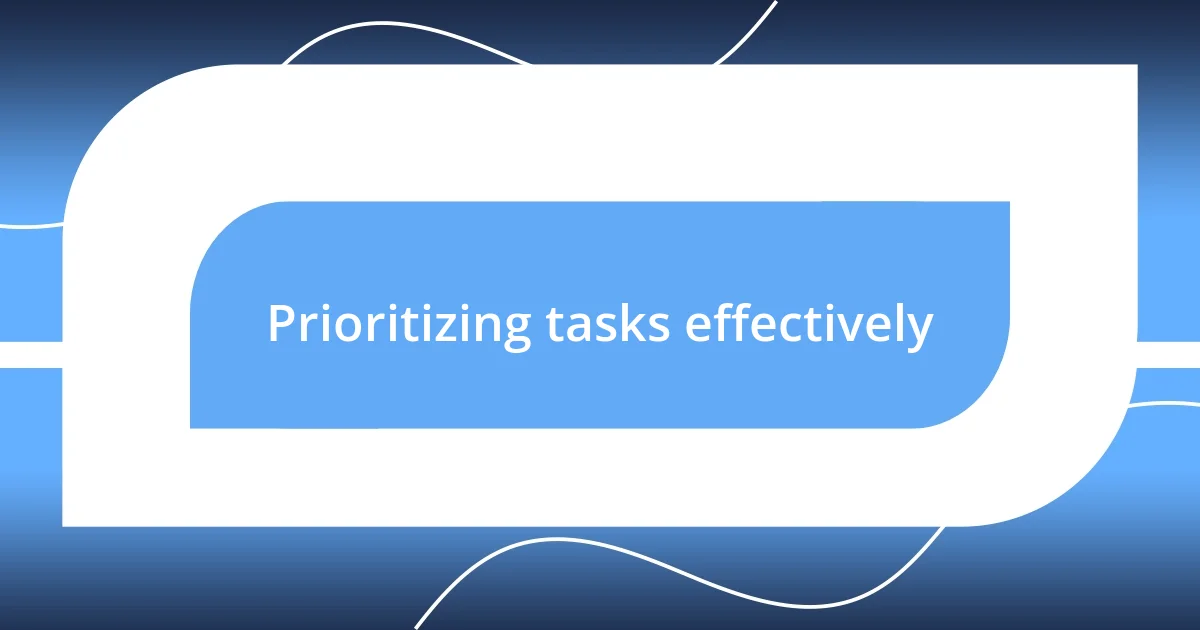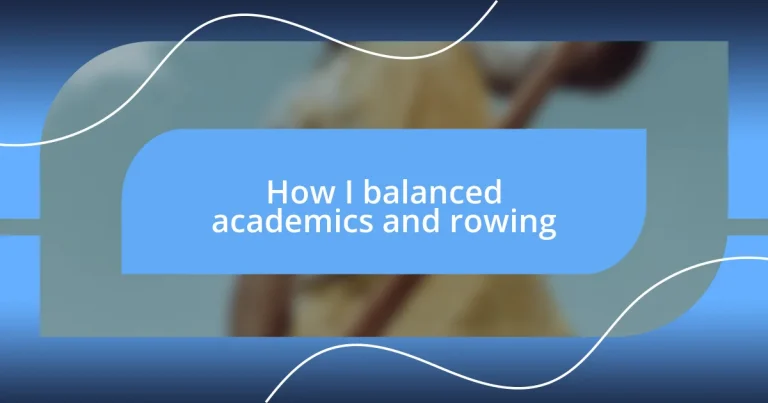Key takeaways:
- Establishing a structured yet flexible routine was crucial for balancing academic and athletic commitments, allowing for effective time management and adaptability to unexpected changes.
- Utilizing prioritization techniques, such as the Eisenhower Matrix, helped distinguish between urgent and important tasks, reducing stress and improving focus on key responsibilities.
- Leveraging support systems, including teammates, professors, and family, reinforced the importance of collaboration and celebrating small victories to maintain motivation and progress in both studies and sports.

Understanding the challenge of balance
Finding balance between academics and rowing can often feel like walking a tightrope. I remember the nights when I would finish a long practice, exhausted but knowing I still had assignments waiting for me. How do you prioritize when both require so much of your time and energy?
There were days I felt defeated, standing at my desk with a textbook in one hand and my racing thoughts about competition in the other. I sometimes asked myself, “Is it worth sacrificing my grades for a sport I love?” It was during these moments of doubt that I learned the true meaning of balance—the understanding that it’s not just about time management, but about mental and emotional commitment.
One strategy I found incredibly helpful was setting micro-goals. Rather than feeling overwhelmed by an entire week’s worth of assignments or a looming regatta, breaking things down into smaller, manageable tasks felt liberating. How about you? Have you ever tried breaking your goals into chunks? It’s amazing how that shift in perspective can make all the difference.

Establishing a structured routine
Establishing a structured routine became my lifeline amid the chaos of academics and rowing. I started by mapping out my week every Sunday, dedicating specific time slots for studying and training. This visual representation of my schedule helped me to stay organized and committed. I recall the satisfaction of checking off each task; it turned my often overwhelming responsibilities into bite-sized, achievable pieces.
In those early days, I struggled with the constant pull between late-night study sessions and early morning practices. I knew I had to find a balance. By creating a routine that catered to my biological rhythms—like identifying when I was most alert for studying—I maximized my efficiency. For example, I’d tackle challenging subjects immediately after sunrise when my mind was fresh and free of distractions, reserving my evenings for lighter review or physical recovery. Have you ever considered how your body’s natural energy levels could guide your routine?
Another essential aspect I learned was the importance of flexibility within that structure. Life is unpredictable, and sometimes, things don’t go as planned. I remember one week when an unexpected competition clashed with a crucial exam review. Instead of panicking, I reshuffled my schedule, prioritizing my immediate responsibilities while remaining committed to my long-term goals. This adaptability kept stress at bay and allowed me to maintain both my academic standing and my dedication to rowing.
| Structured Routine | Flexible Routine |
|---|---|
| Map out the week, setting exact study and practice times. | Adjustments are made based on unforeseen events, maintaining balance. |
| Focus on time management to maximize efficiency. | Prioritize urgent tasks while allowing for spontaneity. |
| Provides clear goals and reduces overwhelm. | Encourages a healthy response to stress and change. |

Prioritizing tasks effectively
When it comes to prioritizing tasks effectively, I often relied on a system that felt both intuitive and empowering. One approach I found beneficial was the Eisenhower Matrix, which helped me distinguish between what was urgent and what was important. I vividly remember a particularly hectic week when I had major assignments due while simultaneously preparing for a significant rowing competition. Creating a visual breakdown of these tasks allowed me to focus on what truly mattered, rather than just responding to the loudest demands.
Here’s how I structured my priority list:
- Urgent and Important: Immediate deadlines, like essays due the next day or crucial row sessions.
- Important but Not Urgent: Long-term projects, academic studies, and regular practices that required planning.
- Urgent but Not Important: Quick responses to emails or routine tasks that could be delegated or postponed.
- Not Urgent and Not Important: Social media or distractions that didn’t contribute to my goals.
I recall a time when I had a couple of late-night study sessions mixed with hours of rowing that seemed to pile up. By sorting these tasks, I could say “no” to social invites and “yes” to the necessary commitments. It became an eye-opening experience; my stress levels decreased significantly as I learned to focus on what truly propelled me forward.

Integrating training with study time
Integrating training with my study time wasn’t just an organizational challenge; it required a mindset shift. I remember one particular day during finals season when I had a big rowing event approaching. I felt this intense tug of war inside me, as if each study hour stole time from my training. To ease that tension, I began using my training sessions as a mental reset. After a tough study block, jumping into a workout cleared my mind and sharpened my focus for the next round of studying.
Finding synergy between both worlds was key. For instance, I would schedule my study sessions around my training. On days when I had longer practices, I opted for shorter, focused periods of study; the adrenaline from rowing invigorated my mind right afterward. I often thought, how could I turn the endurance I built in rowing into stamina for my studies? In doing so, I discovered a connection that made both aspects of my life complement each other beautifully.
I’ve also learned that integrating highs and lows creates balance. When my training peaks were at their highest, I’d remind myself that it was okay to allow my academics to ebb slightly. I still remember the palpable anxiety that came with preparing for an important race while also juggling coursework. Realizing that both rowing and studying demanded my best every day reassured me that as long as I gave my all—regardless of which priority was at the forefront—I was making progress. How can we celebrate those small victories in moments of pressure? For me, acknowledging each completed study session or training day became a way to stay motivated through the chaos.

Maintaining physical and mental health
Maintaining physical and mental health became a cornerstone of my routine. I distinctly remember a particularly grueling week where the demands felt overwhelming. To counterbalance the stress, I instituted a regular self-care regimen. Simple practices like morning stretching or meditation became my lifelines, grounding me amidst the chaos. I’ve often wondered how powerful a five-minute break could be; it turned out to be transformative, enhancing both my mood and focus.
There were days when the weight of my commitments threatened to derail my motivation. In those moments, I learned to tune into my body’s signals. For example, if I noticed myself becoming irritable or fatigued, I would pause and reassess. I vividly recall a day when I was on the brink of burnout. Instead of pushing through, I decided to go for a brisk walk by the river. It was during that walk, feeling the cool breeze on my face, that clarity returned, and I could re-approach my studies with a refreshed mindset. Isn’t it incredible how a simple change of scenery can rejuvenate us?
Additionally, prioritizing sleep made a noticeable difference in my overall well-being. I remember navigating late-night study sessions, but I quickly realized that sacrificing sleep was counterproductive. I began to set a strict bedtime, treating it like an important appointment. This shift empowered me to be consistent in both my rowing and academic pursuits. Have you ever experienced a moment where getting a full night’s rest made it easier to tackle the next day? It’s a game-changer, and I found that my performance in both arenas thrived when I respected my need for rest and recovery.

Leveraging support systems
When I think about leveraging support systems, the first thing that comes to mind is the incredible community I found in my rowing team. We weren’t just teammates; we became a network of encouragement. I can recall a particularly hectic week when finals coincided with our championship regatta. In moments of doubt, just hearing my teammates affirm my abilities reminded me that I wasn’t alone in this journey. Have you ever felt that boost of confidence from those around you? It’s essential to surround ourselves with people who believe in us and can inspire us to keep going.
Additionally, reaching out to my professors made a significant impact on my academic success. I remember a time I was struggling to grasp a challenging concept in one of my classes right before a major regatta. Instead of isolating myself, I approached my professor during office hours. Their willingness to explain the material in a different light was so helpful. It reinforced the idea that seeking help isn’t a sign of weakness but a step towards growth. Have you ever hesitated to ask for assistance, only to find it transforms your understanding? I learned that it’s okay to lean on others; collaboration truly lightens the load.
Lastly, my family was an unwavering support system throughout this balancing act. I often share how my parents checked in with me during tough weeks; their understanding was priceless. One day, after a particularly draining day of training and study, my mom reminded me to take a step back and celebrate my small wins. That simple advice made me realize how easy it is to get caught up in striving for perfection. Their support taught me the importance of acknowledging progress, reminding me that I could be proud of both my academic and athletic efforts. Don’t you think it’s crucial to celebrate even the smallest victories in our lives?

Reflecting on personal growth
Reflecting on my journey, I realize how much I’ve grown through the challenges of balancing academics and rowing. There were moments when I felt torn between hitting the books and making it to practice on time. One particularly eye-opening experience was when I missed a crucial study session for a regatta. I felt guilty at first, but that experience taught me the value of being present in the moment. Have you ever had to make a tough choice, only to learn something invaluable from it? For me, it reinforced the idea that every commitment shapes our path, even if it sometimes feels like a sacrifice.
Learning to manage my time effectively transformed how I approached both rowing and academics. I remember a late night cramming for finals while simultaneously letting my team down by missing a training. I was overwhelmed but desperate to succeed. After that night, I created a detailed schedule, plotting out my days with study blocks and practice sessions. This structure helped me carve out the time I needed. I often wondered, can organization truly unlock personal potential? For me, it was a revelation; I found both clarity and focus, proving to myself that discipline can lead to both academic achievements and athletic success.
Ultimately, these experiences helped me develop resilience that I carry to this day. There were weeks when everything felt like a constant juggling act. I vividly remember talking to a coach after a rough week, expressing my worries about failing at both rowing and my studies. They shared a personal story of their own struggles, which deeply resonated with me. Isn’t it heartening to know that even our mentors face similar challenges? That conversation inspired me to embrace failure as part of the learning process, teaching me that growth often stems from our most trying moments.














